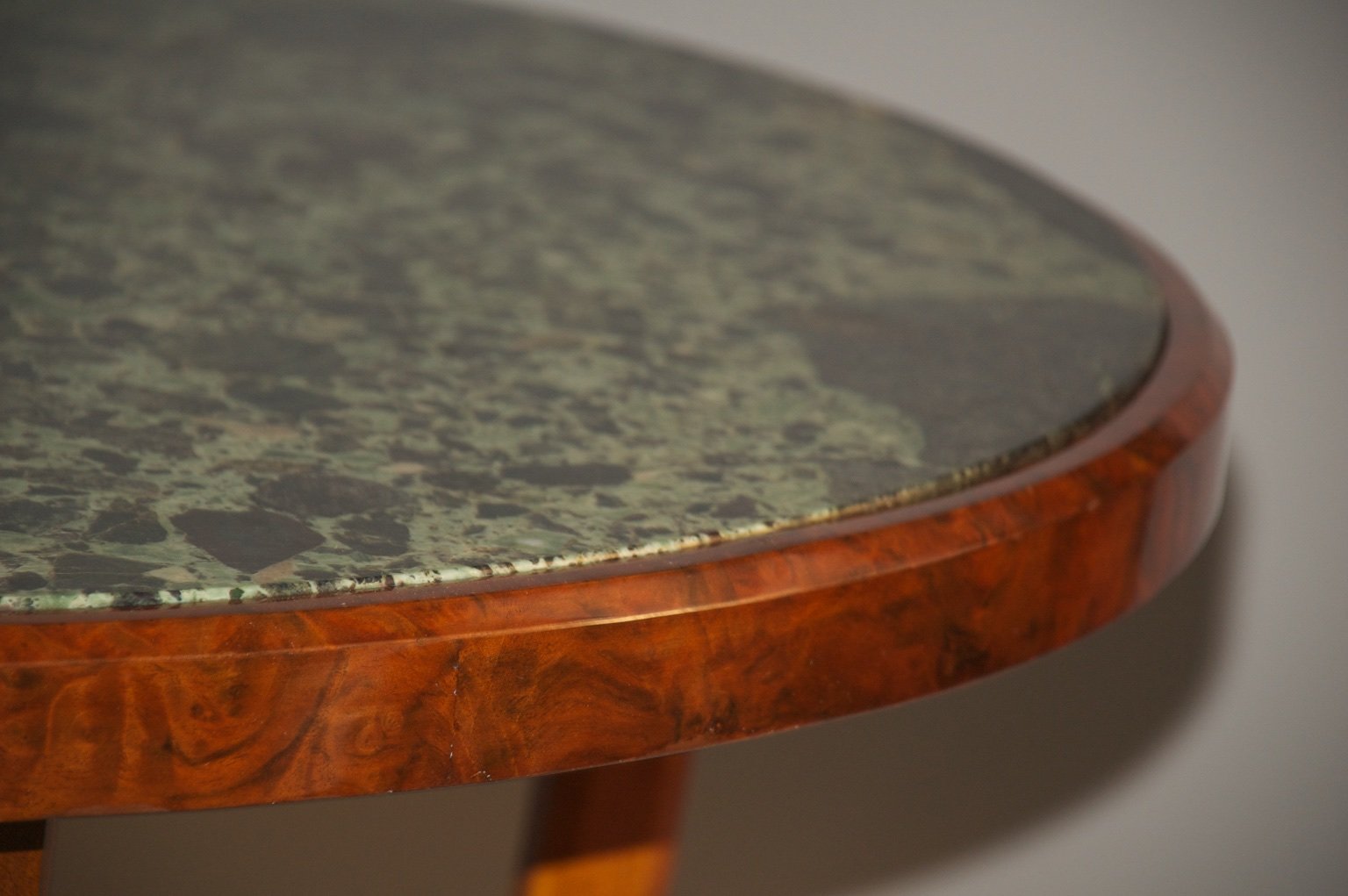 Image 1 of 5
Image 1 of 5

 Image 2 of 5
Image 2 of 5

 Image 3 of 5
Image 3 of 5

 Image 4 of 5
Image 4 of 5

 Image 5 of 5
Image 5 of 5






Jules Leleu low side/coffee table (#1261)
French Modernist Art Deco low side/coffee table by Jules Leleu, circa 1928, in mahogany with original marble top. 32" diameter x 20" high.
JULES-EMILE LELEU
(1883-1961)
French sculptor and designer, Jules Leleu was born and raised in Boulogne-sur-Mer and studied there at the Academie des Beaux-Arts with Theophile Deman. He studied also at a private academy in Brussels and at the Ecole Jean Goujon and Ecole des Arts Appliques in Paris.
In 1901 he and his brother, Marcel, took over their father’s painting business and Jules began working as an interior designer. Shortly after World War I, Jules opened his own interior design studio and furniture workshop in Paris, while also maintaining his cabinetmaking workshops in Boulogne through the 30s. His design aesthetic moderated over time, from the neotraditionalism of his 1920s work, including his presentation at the pivotal L'Exposition internationale des arts décoratifs et industriels modernes in Paris – to more simple lines and techniques in the 1930s and a return to a more decorative, but reinterpreted style in the 1940s. Leleu received numerous government commissions for official and semi-official decors, French embassies, and civic and royal residences. He designed interiors and suites for more than 20 of the great French oceanliners including the Ile-de-France, Atlantique, Normandie, and France.
Leleu began showing his sculptural work in 1905 at the salons of the Societe des Artistes Francais. In 1922 he showed his design work at the same salon for the first time and later at the Salons of the Societe des Artistes Decorateurs, the Salon d’Automne and the Salon des Tuileries.
Leleu’s career continued through the 1950s when he worked also with his son, Andre and his daughter Paule.
French Modernist Art Deco low side/coffee table by Jules Leleu, circa 1928, in mahogany with original marble top. 32" diameter x 20" high.
JULES-EMILE LELEU
(1883-1961)
French sculptor and designer, Jules Leleu was born and raised in Boulogne-sur-Mer and studied there at the Academie des Beaux-Arts with Theophile Deman. He studied also at a private academy in Brussels and at the Ecole Jean Goujon and Ecole des Arts Appliques in Paris.
In 1901 he and his brother, Marcel, took over their father’s painting business and Jules began working as an interior designer. Shortly after World War I, Jules opened his own interior design studio and furniture workshop in Paris, while also maintaining his cabinetmaking workshops in Boulogne through the 30s. His design aesthetic moderated over time, from the neotraditionalism of his 1920s work, including his presentation at the pivotal L'Exposition internationale des arts décoratifs et industriels modernes in Paris – to more simple lines and techniques in the 1930s and a return to a more decorative, but reinterpreted style in the 1940s. Leleu received numerous government commissions for official and semi-official decors, French embassies, and civic and royal residences. He designed interiors and suites for more than 20 of the great French oceanliners including the Ile-de-France, Atlantique, Normandie, and France.
Leleu began showing his sculptural work in 1905 at the salons of the Societe des Artistes Francais. In 1922 he showed his design work at the same salon for the first time and later at the Salons of the Societe des Artistes Decorateurs, the Salon d’Automne and the Salon des Tuileries.
Leleu’s career continued through the 1950s when he worked also with his son, Andre and his daughter Paule.
